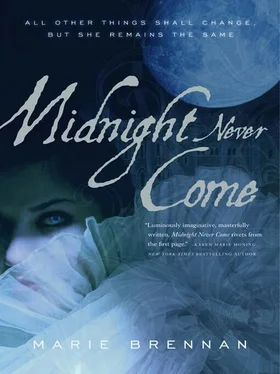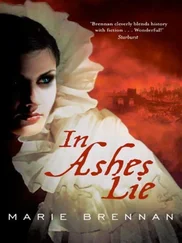“Don Eyague is still here, and has hosted a few visitors. The rumor is that he is being courted by a growing faction in Spain that are dissatisfied with living in a Catholic nation. But I do not know what they intend; I doubt they have the numbers or resources to make any kind of substantial change to the mortal government, even if they decided to mimic her Majesty. For all I know, they may be considering emigration — here, or to the Low Countries. Who can say?”
Fae rarely emigrated, but no matter. Lune had only one question left for Nianna. She glanced casually toward the pair of fae at the nearby fountain, to make sure they were not listening. The lady sat on the stone coping of the edge, framing herself and her red silk gown prettily against the elaborate grotesque that spouted water in five directions, while the gentleman stood and read to her from a book. The sight momentarily distracted her; it looked like the same book the others had been reading beneath the holly tree.
Upon that thought, the book burst into flame.
The gentleman cried out in shock and dropped the burning pages. Lune caught a fleeting glimpse of something streaking across the garden; she turned to track it and saw the book the others held also catch fire. Silhouetted briefly atop the pages was a tiny, glowing, lizard-shaped creature. Then the salamander darted down again, and vanished amidst the flowers of the garden. A trail of smoke showed briefly where it went; then it was gone.
Lune asked, very carefully, “What was that?”
“I did not see, but I believe it was a sal—”
“I am not asking about the creature. What did it just burn?”
“Oh.” Nianna tittered, then hid it guiltily behind her hand. “A mortal book. It has been ever so popular at court, but it seems her Grace does not find it amusing.”
Lune rolled her eyes and seated herself once more on the bench. “Ah. Would this be that poem called The Faerie Queene ?”
“You know of it?”
“The Queen — the mortal Queen — likes it greatly, so of course every courtier who wishes to curry favor must be seen with a copy, or heard quoting it at every suitable occasion.” And a few that were not so suitable; Lune was growing heartily tired of the work. “I am not surprised Invidiana dislikes it.”
“Well, it is very inaccurate. But would she not like that? After all, if the mortals knew the truth, they would come down here with crosses and priests and drive us out.”
Nianna was a brainless fool. The insult was not that it was inaccurate; no one expected accuracy out of poets. Peasants might know the truth about fae — to an extent — but poets took that truth, dried it out, ground it to powder, mixed it with strange chemicals, and used it to dye threads from which to weave a tapestry that bore only the most passing of resemblances to real fae and their lives.
No, the insult was that the Faerie Queen of the title was a transparent symbol for Elizabeth. That would be what Invidiana could not stand.
The gentleman at the fountain was now extemporaneously composing a poem, in a very loud voice, about the swift and merciless wrath of the Queen. He was not very good. Lune ignored him and asked Nianna, “What of Francis Merriman?”
“What?” Nianna had been attending to the poem. “Oh, yes. A few people have heard that name.”
“They have?” Lune restrained her eagerness. She had not forgotten her conversation with Tiresias, over a year ago. There was no Francis Merriman in Elizabeth’s court, at least not yet. She suspected she would find him there — perhaps Elizabeth herself was the one whose secret Merriman held? — but she had to consider other possibilities. “Who knows of him?”
Nianna began to count the names off on her jeweled fingers. “That wretched Bobbin fellow… Lady Amadea Shirrell… one or two others, I think. It does not matter. They all said the same thing. Tiresias mentioned the name to them, at one time or another. Some of them looked for him, but no one turned anything up.”
Hope vanished like a pricked soap bubble. Lune quelled a frustrated sigh; she did not want Nianna to think the matter too important to her. She already had a time of it, impressing upon the lady the merit of keeping her inquiries discreet, lest Invidiana catch wind of them before Lune had this mortal in hand.
Nianna’s words reinforced her growing conviction that she was simply too early. Tiresias was a seer. When he was not raving in confusion about things that never existed, he spoke of the future. Francis Merriman might not even have been born yet.
But when he did appear, Lune intended to be the first to find him.
“Lady Lune,” Nianna breathed, plucking at her sleeve, “I have gathered information for you, as you asked — told you all the news of the court, and answered all your questions. Will you not tell me now of my love?”
Ah yes. Lune said, “He will meet you Friday next, at the tavern called The Hound, that lies near Newgate.”
Many fae at court had mortal friends or lovers. Some knew their companions were fae; a great many more did not. John Awdeley, a clerk of the chaundry at Whitehall Palace, did not know, and so Nianna required assistance in arranging assignations with him, in such a time and place as she could keep up her pretense of being a maidservant in a London mercer’s house.
She did not love him, of course, but she was infatuated with him for now, and being fae, now was all that mattered.
Lune answered Nianna’s subsequent questions with rapidly diminishing patience; she had no interest in describing the state of Awdeley’s beard, nor recounting how many times he had asked after his maidservant love. “Enough,” she said abruptly, when Nianna asked for the seventh time whether he had shown any favor to other women, and if so, their names and stations, so she might curse them and teach them the foolishness of being rival to a fae. “I do not follow the man his every waking moment; I have little to do with him. And our bargain was not that I would recount his doings to you, down to the contents of his supper. You have your meeting with him, and I the latest news of the court. Now begone with you.”
Nianna drew herself up in a graceful, offended ripple. “How dare you speak so dismissively to me? Who do you think you are?”
“Who am I?” Lune smiled, giving it a malicious edge. “While you trail after Invidiana, carrying her gloves and her fans and enduring the brunt of her wrathful moods, I eat mortal bread every day and report to her the secret doings of Elizabeth’s court. I am, moreover, your pander to this mortal you have set your sights upon. What aid I give you there, I can revoke. Turning his thoughts to another woman would be easy.”
The lady hissed, all warmth of manner instantly gone. “Your body would be floating in Queenhithe by the next morning for fish and gulls to peck at.”
“Would it?” Lune met her gaze unblinking. “Are you sure?”
The specter of the Queen was so easy to invoke. And while Invidiana certainly did not come to the aid of every fae who claimed the possibility, she took no offense at being so named; it served her purposes to be a figure of terror to her courtiers. She even made good on the threats occasionally, simply to keep everyone guessing. The threats would lose their meaning if they never bore teeth.
Nianna backed down, but not graciously. Lune might have to find a new informant to keep her abreast of matters. She would not have antagonized Nianna so, but the conference with Vidar had put her back up, and left her with no patience for the lady’s passing mortal infatuation.
They parted on coldly courteous terms, and Lune wandered through the garden alone. Two faerie lights drifted loose from the constellation above and floated about her shoulders. Lune brushed them away. Since losing her position in the privy chamber, she had not the rank or favor to merit such decoration, and did not want anyone carrying tales of her presumption. By the time they reached the ears of those in power, the casual wanderings of two faerie lights would be a halo of glory she had shaped and placed on her own head.
Читать дальше












